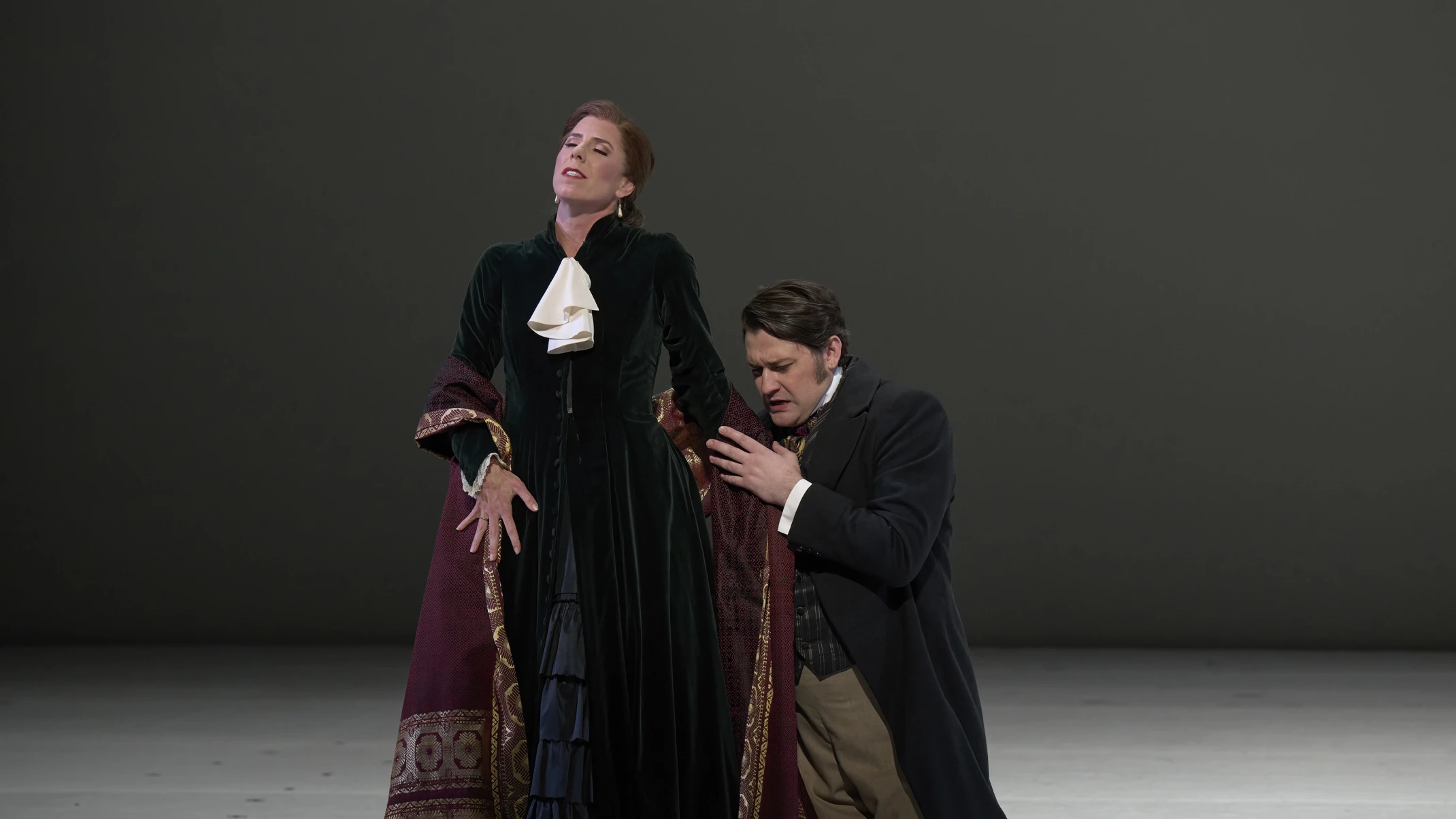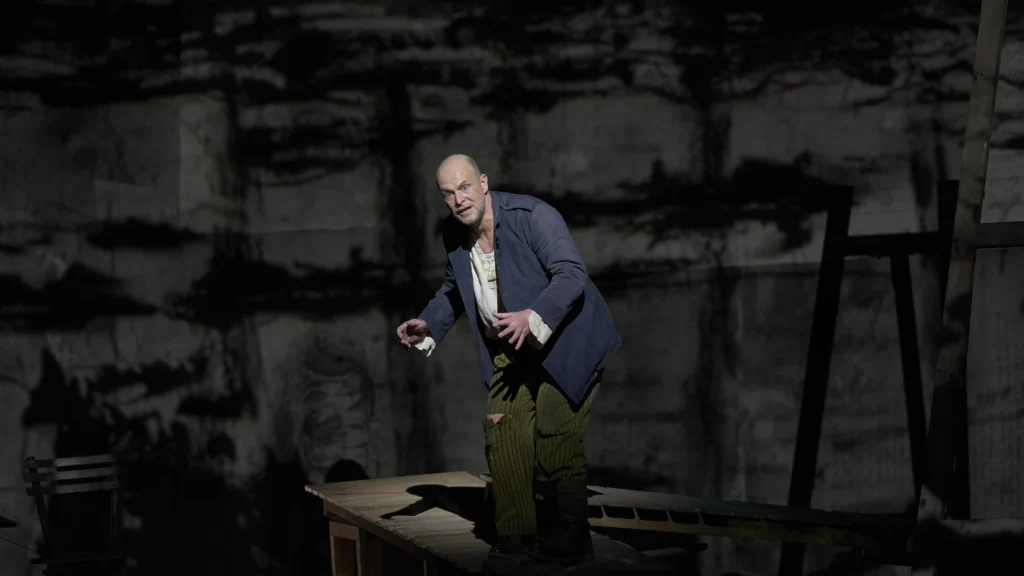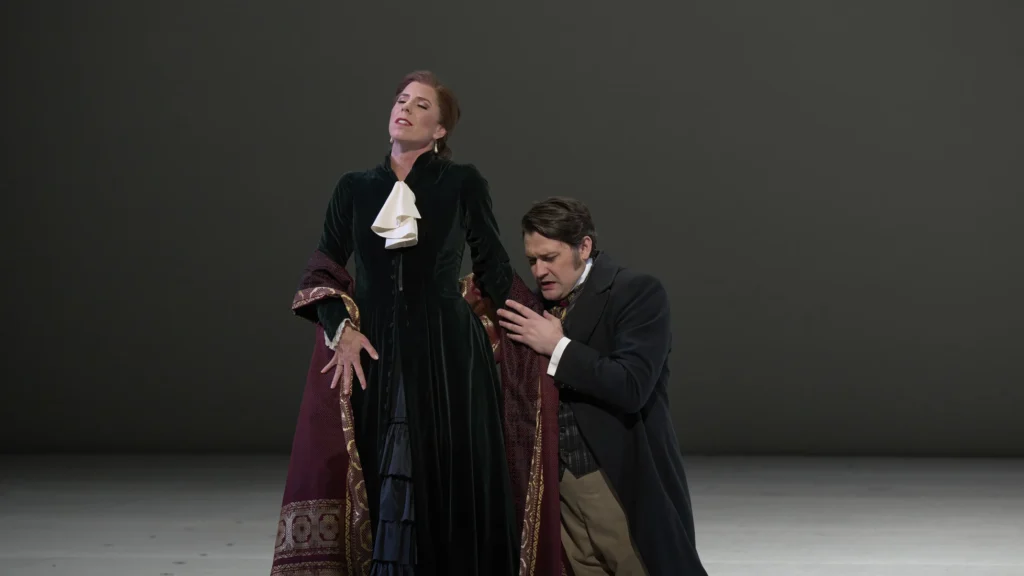
Wozzeck by Alban Berg, libretto by the composer, based on the play by Georg Büchner, conducted by Johannes Debus, production conceived by William Kentridge, Four Seasons Centre, closes May 16.

Photo by Michael Cooper
In all my years of covering the performing arts, I have come to the conclusion that the greatest artistic crimes are committed in the opera world.
Take for example, this production of Alban Berg’s Wozzeck. South African producer William Kentridge, aided and abetted by a European creative team, is responsible for this bizarre and misguided vision. His supposed explanatory program note is simply bafflegab.
The benchmark of any production of Wozzeck is the ending. I am forever haunted by that little boy playing on his hobby horse, hip hop, hip hop, not realizing that his mother has been murdered and his father has drowned. Not only is the child in this production represented by a puppet, but it is by far the most grotesque, ugly puppet on earth, and one that has, it seems, no mobile capabilities. And the fact that we see the handler is even more distracting., particularly as she is not even dressed in black like any self-respecting kuroko. As a result, I felt a big fat nothing at the end of the opera which does much disservice to the composer.
And then there is the set which looks like it’s been built by carpenters on meth – a wooden structure going hither and thither filled with crevices and festooned with platforms. You never know from which hole or height a character is going to appear.
The opera begins promising enough. Wozzeck sets up what turns out to be a movie projector which is something of an interesting surprise. From here, however, things go downhill as this one little screen becomes a cyclorama of a dizzying array of non-stop projections of historical scenes and historical figures and a mishmash of symbols that create one big visual mush.
There is one effect that I did like and that is the almost mysterious arrival of the chorus.
Since one realizes early on that we are in for a gruesome 100 minutes of what passes for South African Eurotrash, at least there is Berg’s stunning modernist 12-tone score, its very discordant nature evoking the European bleakness that followed World War One. (The opera premiered in 1925.)
Wozzeck is a beaten man, literally victimized by all his superiors. While German baritone Michael Kupfer-Radecky certainly sang well enough, he was seemingly just a regular fellow, exuding nothing of the sturm und drang of his pitiful existence. The singer does have the spectacular chops that allow him to sing all the great baritone roles in German opera and beyond, and I would dearly love to see his stage work with a different director.
The other foreign singer in this otherwise Canadian cast is Austrian bass Anthony Robin Schneider as The Doctor who possesses another over-sized Germanic voice, booming but smooth. He also captured just the right amount of his character’s dispassion.
The Canadians mostly give a good account of themselves.
Soprano Amber Braid possesses a big strong impressive voice, but I wish she had acted more alluring. She is certainly capable of being sexy as demonstrated by her Salome.
Tenor Michael Schade as The Captain is Wozzeck’s greatest oppressor and he really found his métier, giving the best performance both in singing and acting. Schade was absolutely hateful.
Tenor Matthew Cairns certainly has a meat and potatoes tenor (read Verdi and Puccini), but he was a bit tentative in his acting as The Drum Major. A big sing but he needed more oomph.
Rounding out the cast and doing a good job are tenor Michael Colvin as The Fool, tenor Owen McCausland as Andres, and mezzo-soprano Krisztina Szabo as Margret.
Which brings us to Maestro Johannes Debus in the pit. The Berg score is just the thing that Debus loves to sink his teeth into, to plumb the depths of the music for its richness, to fill the hall with sound, and quite frankly, the orchestra was one of the few saving graces of the evening.
Eugene Onegin by P.I. Tchaikovsky, libretto by the composer and K.S. Shilovsky, based on the verse novel by Aleksandr Pushkin, conducted by Speranza Scapucci, revival direction by Peter McClintock, original direction by Robert Carsen, Four Seasons Centre, closes May 24.

I have a history with this production of Eugene Onegin.
I was actually in New York in 1997 and saw Canadian director Robert Carsen’s visionary interpretation when it was brand new at the Metropolitan Opera. In fact, I was so moved by what Carsen and designer Michael Levine were attempting to do that at intermission, I raced to the press room to tell the publicist just how marvellous the production was.
And that’s when I found out that the New York critics had savaged Carsen’s work. In 1997, it seems, the New York critics were purists or traditionalists, and Carsen’s impressionistic treatment was just too avantgarde. If I remember rightly, however, when the Times critic was doing his year end wrap, he admitted that perhaps he had been wrong in his initial harsh judgement, and a second viewing had given him a new perspective.
During the years since, I have never forgotten those mismatched chairs at the Larin name day party – as if every chair in the house had been corralled to seat the guests. What an utterly clever idea it is, particularly in contrast to the Gremin ball, with beautifully matched chairs each accompanied by a footman.
And that is the greatness of this production – its symbolic simplicity.
The opera begins and ends with Onegin sitting alone in a chair, his posture indicating an empty shell of a man. Every scene of the opera is scaled down to its bare essence to reflect his sharpest memory. The autumn leaves in the Larin garden which become the theme that represents the deadness of Onegin’s existence. The name day gathering that is so provincial in Onegin’s eyes. The misty glen where the duel was fought. The glittering Gremin ball.
The one outlier is Tatyana’s bedroom where she writes the letter to Onegin. The room is dwarfed in the middle of the stage, and it is her imagination that fills the space around her. When she actually leaves her room, she enters into her fevered imagination creating a visual effect that is quite startling.
The other main component of the set design is the back wall, which allows the play of the lighting to reflect mood. It should also be noted that Levine designed very realistic costumes to augment the sparser visual element. How clever the quite overdone dresses for Tatyana and Olga at the name day party which beautifully depict what country girls think is chic – in contrast to the dazzling oh so soigné gown of Tatyana at the ball. And then there are the Russian folkdances at the Larin estate as opposed to the wild couple dash and swing at the Gremin ball, courtesy of Canadian choreographer Serge Bennathan,
In short, the totality of the production design and direction is realism against minimalism layered with contrasts, and it works on every level.
Happily, the music is top notch as well.
Italian conductor Speranza Scappucci is back in the pit after her triumphant Macbeth of a few years ago, and needless to say, the Maestra has found all the drama and passion in the score.
Australian soprano Lauren Fagan absolutely captures both the fragile young Tatyana and the sophisticated princess she later becomes. She is a lyric soprano with heft in her voice which produces a firm strong yet pleasing sound.
Judging from her credits, diminutive American mezzo-soprano Megan Marino is in the early stages of her career, but she produces a bold crystalline sound that belies her small frame. She is also a sensational actress.
Welsh bass-baritone Andrii Kymach is a bit wooden as Onegin but his smooth, yet commanding voice makes up for it. His is the type of sound that can be thrilling at times.
American tenor Evan Leroy Johnson almost overacted as Lensky, but he was exciting nonetheless and is clearly not afraid to take chances with overtly passionate singing. He has a strong vibrant voice that assaults the ear, but in a good way.
The aria of Prince Gremin is one of my favourites and I want the singer to move me as he tells us about the joys of his young wife. Thankfully Russian bass Dimitry Ivashchenko gave me what I wanted with his mellifluous yet forceful sound and heartfelt delivery.
The two deeper mezzo-sopranos – Canadian Krisztina Szabo as Madame Larina and American Emily Treigle as Filipyevna – gave sterling performances. Treigle, in particular, is almost a contralto with a luscious lower register.
Canadian tenor Michael Colvin had great fun as Monsieur Triquet. He posseses the clear bright voice that is quintessential for a character tenor.
Between the intriguing visual element and the high-class music-making, this was a most satisfying Eugene Onegin.
